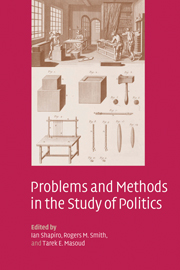Book contents
- Frontmatter
- Contents
- List of contributors
- Acknowledgments
- 1 Introduction: problems and methods in the study of politics
- Part I Description, explanation, and agency
- 2 Problems, methods, and theories in the study of politics, or: what's wrong with political science and what to do about it
- 3 The politics of identities and the tasks of political science
- 4 Political science as a vocation
- 5 The politics of policy science
- 6 The study of black politics and the practice of black politics: their historical relation and evolution
- 7 External and internal explanation
- Part II Redeeming rational choice theory?
- Part III Possibilities for pluralism and convergence
- Index
- References
4 - Political science as a vocation
Published online by Cambridge University Press: 22 September 2009
- Frontmatter
- Contents
- List of contributors
- Acknowledgments
- 1 Introduction: problems and methods in the study of politics
- Part I Description, explanation, and agency
- 2 Problems, methods, and theories in the study of politics, or: what's wrong with political science and what to do about it
- 3 The politics of identities and the tasks of political science
- 4 Political science as a vocation
- 5 The politics of policy science
- 6 The study of black politics and the practice of black politics: their historical relation and evolution
- 7 External and internal explanation
- Part II Redeeming rational choice theory?
- Part III Possibilities for pluralism and convergence
- Index
- References
Summary
Perhaps rigorous science makes for totalitarian politics, but democratic politics permits rigorous science. Perhaps democratic politics makes errors necessary, but discoveries possible. Perhaps ethics are fulfilled in the abandonment of principle for practice. Perhaps science is advanced less by duty than by desire. Perhaps an uncertain politics can provide better guidance than a certain science. These are the possibilities this chapter advances.
The ethic in which I was trained suggested that if we were careful, if we were responsible, if we took certain precautions, if we confined politics to a carefully demarcated sector (rather like the ghetto or the West Bank) we could do science honestly and honorably. The ethical conduct of political science required discipline. The ethical conduct of political science required the evacuation of politics or rather, that politics come into political science only as an object, never as a source of imperatives. This ethic, for which I have a lingering respect, argued that “the professor has other fields for the diffusion of his ideals” and “should not demand the right as a professor to carry the marshal's baton of the statesman or reformer in his knapsack”;(Weber 1949: 5).
This ethic directed us to science as a discipline, science as a duty. We were required to subordinate our political to our scientific ideals. We were impelled to go where our investigations led us. If our work led us to conclusions that we found politically distasteful, we were obliged to accept them.
Information
- Type
- Chapter
- Information
- Problems and Methods in the Study of Politics , pp. 67 - 82Publisher: Cambridge University PressPrint publication year: 2004
References
Accessibility standard: Unknown
- 6
- Cited by
